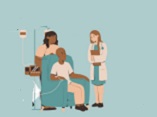Early Versus Late Pediatric Palliative Care in Oncology: A Systematic Review of Outcomes, Disparities, and Implementation Barriers
DOI:
https://doi.org/10.31661/gmj.v14i.4007Keywords:
Pediatric Palliative Care; Oncology, Early Integration; End-Of-Life Care; Quality Of Life; Healthcare Disparities; Systematic ReviewAbstract
This systematic review, conducted per PRISMA 2020 guidelines, synthesizes evidence on early pediatric palliative care (PPC) versus late or no PPC in children and young adults (0–21 years) with life-threatening oncologic illnesses. A comprehensive search of MEDLINE, Embase, Scopus, PsycINFO, Web of Science, Cochrane Central, and grey literature (ProQuest, ClinicalTrials.gov) from inception to 1 August 2025 identified 12 studies, including retrospective cohorts, surveys, and one randomized controlled trial across the USA, Canada, Taiwan, and Spain. Early PPC, variably defined as initiation from diagnosis to >12 months before death, consistently reduced end-of-life care intensity (fewer ICU admissions, mechanical ventilation, invasive interventions), increased hospice enrollment, home deaths, and improved quality of life and symptom management compared to late or no PPC. Disparities were evident, with minority groups and patients with hematologic malignancies less likely to receive early PPC, compounded by barriers such as provider misconceptions, systemic limitations, and clinical trial enrollment delays. Outpatient and integrated home-hospital PPC models significantly lowered hospital-based end-of-life care, though robust late PPC programs could achieve comparable outcomes. Narrative synthesis using the GRADE approach highlighted moderate to high confidence in reduced care intensity and improved family outcomes with early PPC, despite heterogeneous definitions and study designs precluding meta-analysis. Findings show the need for standardized PPC protocols, education to address provider barriers, and policy reforms to enhance equitable access, particularly for underserved populations. While oncology evidence is robust, further randomized trials are needed to strengthen findings across other conditions, supporting early PPC integration to optimize patient and family outcomes in pediatric oncology.

Published
How to Cite
Issue
Section
License
Copyright (c) 2025 Galen Medical Journal

This work is licensed under a Creative Commons Attribution 4.0 International License.







